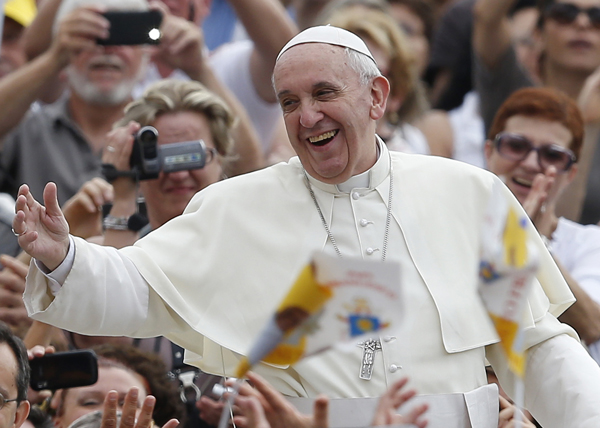VATICAN CITY (RNS) Once again breaking with traditional Vatican protocol, Pope Francis on Wednesday (Sept. 11) penned a long letter to the Italian liberal daily La Repubblica to affirm that an “open dialogue free of prejudices” between Christians and atheists is “necessary and precious.”

Pope Francis greets the crowd as he arrives to lead his general audience in St. Peter’s Square at the Vatican on Wednesday, Sept. 11. Photo by Paul Haring/Catholic News Service
Francis’ front-page letter was a response to two open letters published in previous months by Eugenio Scalfari, the founder of La Repubblica and an avowed atheist.
The pope’s letter is especially notable for its open and honest assessment of the spiritual state of nonbelievers. And for an institution that long claimed sole jurisdiction on matters of salvation, Francis seems to open the door to the idea that notions of sin, conscience and forgiveness are not the exclusive domain of the Catholic Church.
In his messages to the pope, among other things, Scalfari had asked him whether “God forgives those who do not believe and do not seek faith.”
Francis seemed to hint in his response that those who don’t believe are not necessarily excluded from God’s forgiveness.
“Given that — and this is the key point — God’s mercy has no limits, if you go to him with a sincere and repentant heart, the issue for those who do not believe in God is to obey their conscience,” Francis writes in his letter.
“Sin, even for those who have no faith, is when one goes against their conscience,” he added. “To listen and to obey to (one’s conscience) means to decide oneself in relation to what’s perceived as good and evil. And this decision is fundamental to determining the good or evil of our actions.”
Speaking about the church’s relationship with Jews, Francis stresses that Christians, and humanity as a whole, should be grateful that Jews have “kept their faith” despite “the terrible tests of the past centuries.”
In the letter, the Argentine pope also addresses one of the themes of his predecessor, Pope Benedict XVI, who had often condemned “relativism” — the incapacity of modern societies and men to recognize any “absolute truth,” such as God — as one of the evils of our time.
For Francis, there is no such thing as an “absolute truth” if that means a truth that can stand by itself “without any relationship.”
“Truth, according to the Christian faith, is God’s love for us in Jesus Christ. Therefore, truth is a relationship.”
Francis concludes: “Despite the slowness, the infidelity, the errors and sins it committed and might still commit against its members, the Church, trust me, has no other meaning and goal but to live and witness Jesus.”




